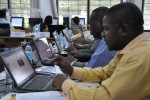How can children reach their full potential, when their early education is taught in a language that they are both uncomfortable and unfamiliar with? In countries with diverse linguistic communities this is the harsh reality for many children growing up as part of a minority group. In Africa, the problem is rendered especially tricky by the prevalence of foreign and colonial languages in education, […]
Recent news
From free educational resources to MOOCs
A support policy for the development of free educational resources The French Ministry for Higher Education and Research (MESR) has driven and supported a policy for the national-level sharing of digital learning content according to major disciplinary fields. As a part of this policy, the Ministry set up seven Thematic Digital Universities (UNTs) between 2004 and 2007.
Making African voices heard
If you rely on the Western-dominated global media for your picture of Africa, you will receive a very distorted view. We all have our own experiences of stereotypical images, sweeping generalisations and the “famine and war” agenda that characterise so much of the reporting of Africa to the world.
My full name is Obiakor, Vera Ada. I am 42 years old and have been a teacher for 17 years. I teach Further Mathematics and I am the ICT coordinator in my school Government Secondary School, Kubwa. I take pictures as a hobby and have been taking pictures for 6 years. My school is situated in a semi-rural community of Kubwa in FCT Abuja, […]
Physically Active Youth Namibia: in conversation with Nenad Tomić
Nenad Tomić is a life scientist who recently served as a volunteer Academic Officer at P.A.Y. Namibia – Physically Active Youth – teaching natural sciences, mathematics, English and German. The programme, now in its tenth year, is based in the Windhoek township of Katutura, whose name, meaning “the place where we do not want to live”, dates back to the apartheid-era forced resettlement of the black […]
The potential of eLearning for health
Skilled human resources are the backbone of any performing health system. But many developing countries face a human resource crisis due to health workforce shortages, brain drain and lack of adequate training. Increasing health interventions aimed at reducing child and maternal mortality and tackling diseases such as HIV/AIDS, malaria and TB require more and better-trained healthcare personnel. In order to meet the health-related Millennium […]
ICT in the classroom: Namibian teachers share their experience
Education has been a top priority in Namibia for some time now. The government has been directing a lot of resources and expertise into establishing effective systems and policies that will have a positive impact in classrooms and on students. Information and communication technologies have been a very important part of this process, and classrooms are benefiting from better technology and a more learner-centric […]
A letter from Dr Maggy Beukes-Amiss
Dr Maggy Beukes-Amiss is a Head of Department and Senior Lecturer at the University of Namibia. Her many achievements – a Doctorate in Computer-integrated Education (CiE) from the University of Pretoria, her over 17 years’ teaching experience in ICT-related subjects – tutoring and training of various participants in eLearning related courses in Namibia and internationally – and her activities as a conference paper reviewer […]
Social Learning: a Namibian Experiment
In Sub-Saharan Africa, innovative approaches are constantly being developed to address the region’s acute education challenges. Low literacy levels, inadequate school facilities, and high dropout rates are felt acutely, particularly in rural areas. Despite government initiatives to tackle these issues, accessing education remains difficult for some, especially those who have abandoned their studies and find it difficult to re-join school or gain employment in […]
Knowledge repositories – building blocks for learning
A knowledge repository is an online database that organises, displays and categorises information. It can be used to provide support and management for many services, including encouraging open access to scholarly research, preserving digital materials for the long term and showcasing academic research. But whilst repositories are becoming increasingly commonplace in Africa and around the world as houses of shared institutional memory, information on […]



























